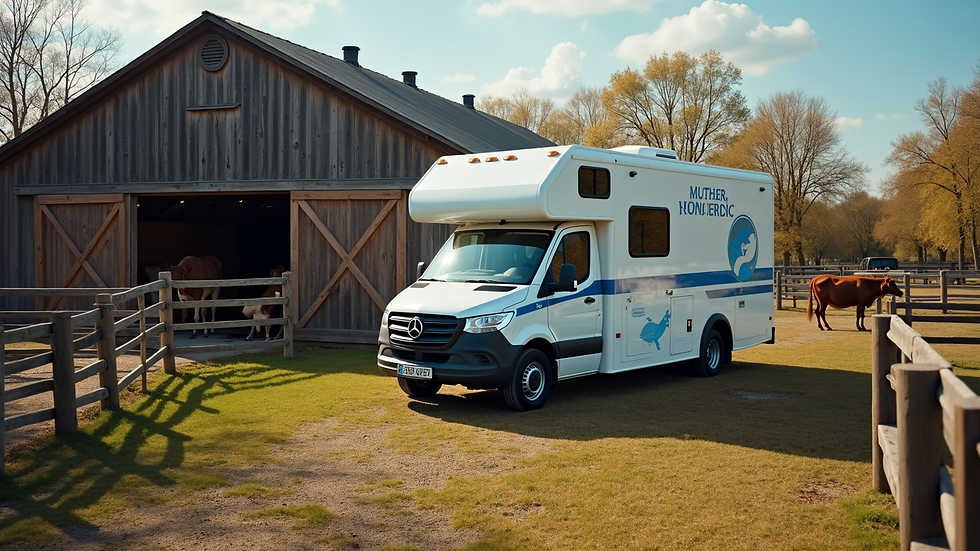Pet Vaccination Services: A Must for Health
- Rachelle
- Sep 15, 2025
- 4 min read
When it comes to caring for large animals on farms and ranches, keeping them healthy is a top priority. One of the most important steps in maintaining their well-being is vaccination. Vaccines protect animals from serious diseases that can affect their health, productivity, and even their lives. I want to share some practical pet vaccination tips that can help you keep your animals safe and thriving.
Vaccinating your animals is not just about following a routine. It’s about understanding why vaccines matter, when to give them, and how to make the process smooth and effective. Whether you raise cattle, horses, sheep, or goats, these tips will guide you through the essentials of vaccination.

Why Vaccination Is Essential for Large Animals
Vaccines work by stimulating the animal’s immune system to fight off specific diseases. Without vaccination, animals are vulnerable to infections that can spread quickly in rural settings. Diseases like rabies, tetanus, and bovine respiratory disease can cause severe illness or death.
Vaccination helps:
Prevent outbreaks that can affect entire herds or flocks.
Reduce the need for antibiotics by stopping infections before they start.
Protect your investment by keeping animals healthy and productive.
Ensure safety for people who work closely with animals.
In rural Missouri, where farms and ranches are spread out, it’s easy to overlook vaccination schedules. But staying on top of vaccinations is a simple way to avoid costly health problems later.
Practical Pet Vaccination Tips for Large Animals
Keeping your animals up to date on vaccines requires planning and attention. Here are some tips that have worked well for me and many others in rural areas:
Create a vaccination schedule based on your animals’ species, age, and risk factors. Consult your veterinarian to tailor the plan.
Keep detailed records of each animal’s vaccinations, including dates and types of vaccines given.
Use proper storage for vaccines to maintain their effectiveness. Most vaccines need refrigeration.
Administer vaccines carefully following the recommended dosage and injection sites.
Monitor animals after vaccination for any adverse reactions, and report concerns to your vet immediately.
Plan vaccinations during calm weather to reduce stress on animals and handlers.
Combine vaccinations with other health checks to save time and reduce handling stress.
By following these steps, you can make vaccination a smooth part of your animal care routine.

How to Choose the Right Vaccines for Your Animals
Not all vaccines are necessary for every animal. The choice depends on factors like:
Local disease risks in your area.
Animal species and breed.
Age and health status.
Exposure to other animals or wildlife.
For example, cattle in Missouri might need vaccines for bovine viral diarrhea (BVD), leptospirosis, and clostridial diseases. Horses often require vaccines for tetanus, Eastern and Western equine encephalomyelitis, and West Nile virus.
Your veterinarian is the best resource to help you decide which vaccines are essential. They can also advise on booster shots and timing to keep immunity strong.
The Role of Mobile Veterinary Services in Rural Areas
Access to veterinary care can be challenging in rural Missouri. That’s why mobile veterinary services are a game-changer. They bring professional care directly to your farm or ranch, saving you time and stress.
Using pet vaccination services from a trusted mobile vet means:
Convenient scheduling that fits your busy day.
Personalized care tailored to your animals’ needs.
Expert advice on vaccination and overall health.
Reduced animal stress by avoiding transport to clinics.
Mobile vets understand the unique challenges of rural animal care and provide reliable support to keep your animals healthy.

Tips for Preparing Your Animals for Vaccination Day
Preparation can make vaccination day easier for both you and your animals. Here are some helpful tips:
Handle animals gently in the days leading up to vaccination to build trust.
Keep animals calm on the day of vaccination by minimizing loud noises and sudden movements.
Have all equipment ready including syringes, vaccines, and records.
Ensure animals are clean and dry to reduce infection risk at injection sites.
Provide fresh water and feed after vaccination to help animals recover comfortably.
Observe animals closely for a few hours after vaccination for any signs of discomfort or allergic reactions.
Being prepared helps the process go smoothly and keeps your animals comfortable.
Staying Consistent for Long-Term Health
Vaccination is not a one-time event. It requires consistency and commitment. Regular boosters and updates based on veterinary advice ensure your animals remain protected throughout their lives.
Remember, healthy animals are more productive and happier. They contribute to the success of your farm or ranch. By prioritizing vaccination, you are investing in their future and yours.
If you want to make vaccination easier and more reliable, consider reaching out to mobile veterinary services in your area. They bring expertise and convenience right to your doorstep.
Taking these steps will help you maintain a strong, healthy herd or flock for years to come. Your animals deserve the best care, and vaccination is a key part of that care.
Thank you for reading these pet vaccination tips. I hope they help you keep your animals safe and healthy on your farm or ranch. Remember, prevention is always better than cure, and vaccination is the best prevention.



Comments